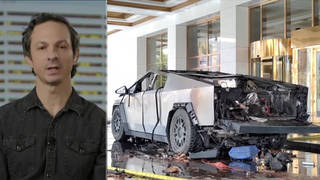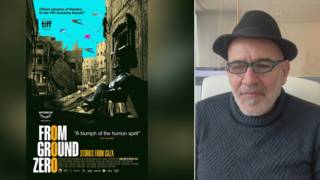
Related
Guests
- Christine Ahnfounder and international coordinator of Women Cross DMZ, a global movement of women mobilizing to end the Korean War.
Links
In Pyeongchang, South Korea, the 2018 Winter Olympics have opened, with North and South Korean athletes marching together at the open ceremonies. The games are seen as a pivotal moment for relations between the two countries, who have been officially at war since 1950. In an effort to de-escalate tensions on the Korean Peninsula, North Korea has sent a 500-person delegation of athletes, musicians and performers to the Olympics. North Korean leader Kim Jong-un’s influential sister attended today’s opening ceremony and shook hands with South Korean leader Moon Jae-in; the pair are scheduled to have lunch together. But as the peninsula tries to de-escalate the threat of nuclear war, U.S. Vice President Mike Pence warned the U.S. is slated to impose another round of sanctions against North Korea. We speak to Christine Ahn, the founder and international coordinator of Women Cross DMZ, a global movement of women mobilizing to end the Korean War.
Transcript
AMY GOODMAN: This is Democracy Now! I’m Amy Goodman. In Pyeongchang, South Korea, the 2018 Winter Olympics have opened, with North and South Korean athletes marching together at the opening ceremonies. The games are seen as a pivotal moment for relations between the two countries, who have been officially at war since 1950. In an effort to de-escalate tensions on the Korean Peninsula, North Korea has sent a 500-person delegation of athletes, musicians, performers to the Olympics. North Korean leader Kim Jong-un’s influential sister attended this today’s opening ceremony, shook hands with the South Korean leader Moon Jae-in; the pair are scheduled to have lunch together.
But even as the peninsula tries to de-escalate the threat of nuclear war, U.S. Vice President Mike Pence warned the U.S. is slated to impose another draconian round of sanctions against North Korea. Pence is set—is leading the U.S. delegation during today’s opening ceremony and will reportedly attend the games with the father of Otto Warmbier, the American college student who died after being imprisoned in North Korea. This is Pence speaking Thursday.
VICE PRESIDENT MIKE PENCE: Allow me to just assure you and the people of South Korea that the United States of America will continue to stand shoulder to shoulder in our effort to bring maximum pressure to bear on North Korea, until that time comes when they finally and permanently and irreversibly abandon their nuclear and ballistic missile ambitions.
AMY GOODMAN: South Korean President Moon Jae-in held a meeting with Pence in Seoul soon after he arrived in South Korea. This is Jae-in speaking on Thursday.
PRESIDENT MOON JAE-IN: [translated] I would like to make an effort to use this opportunity, as much as I can, to bring North Korea back to the dialogue table for the North’s denuclearization and to build peace on the peninsula. I always emphasize that the most important thing in this process is the airtight cooperation between South Korea and the United States. And I think this moment, being with Vice President Pence, shows the cooperation firmly.
AMY GOODMAN: Well, for more, we’re joined by Christine Ahn, the founder and international coordinator of Women Cross DMZ, a global movement of women mobilizing to end the Korean War.
Christine Ahn, it’s great to have you with us actually in studio today. So, talk about the significance of what’s happening, as we speak, in South Korea. A 500-person North Korea delegation marching together with South Korea hasn’t happened since 2006.
CHRISTINE AHN: It’s extraordinary. I mean, they just—and, I think, just happened, you know, within the past hour. North and South Korean athletes marched into the opening ceremony of the Olympics carrying a one-Korea flag. Apparently, the entire stadium just broke out in applause. You know, it’s a just hugely momentous moment that we’re in right now. And the only person that didn’t allegedly clap was, of course, U.S. Vice President Mike Pence.
AMY GOODMAN: Pence, who leads the U.S. delegation. And talk about what he has done, first going to Japan with Shinzo Abe and making the announcement that, as North and South Korea come together, at least for these Olympics, the U.S. is imposing more draconian sanctions against North Korea.
CHRISTINE AHN: Yeah, I mean, just the irony is so deep, to be stopping in Tokyo, meeting with Shinzo Abe, you know, whose grandfather was a Class A war criminal that hunted down North Korean independence fighters, and to have Shinzo Abe, a former—you know, from Japan, a former colonial occupier, of Japan, be with the United States, who is basically throwing shade at this incredible inter-Korean peace process, and to say that we are going to just discontinue this policy of maximum pressure to force North Korea to denuclearize. I mean, that clearly isn’t working. And what we do see is it having extraordinarily negative consequences for civilians in North Korea. So, you know, it feels like there is this incredible—the winds of peace blowing across the DMZ, and then, of course, this like very dark cloud hovering over Washington, D.C., that is really trying to derail this hopeful inter-Korean peace process.
AMY GOODMAN: And you have North and South Korea forming a joint women’s hockey team?
CHRISTINE AHN: It’s extraordinary. I mean—
AMY GOODMAN: What about Moon Jae-in having lunch with Kim Yo-jong, the influential sister of Kim Jong-un? They just shook hands.
CHRISTINE AHN: Right. It’s the first time that a member of the Kim family has stepped foot on South Korean soil. And, you know, she’s not just like a figurehead. I mean, my understanding is that Kim Yo-jong is—you know, she’s in charge of the light industries in North Korea, so she wields tremendous influence over the country’s economy. And, you know, I hope that this is—I hope that they are able to talk about future developments. And, you know, it has been signaled that North Korea will receive—or that North Korea will send an invitation to Moon Jae-in to go to Pyongyang later this year.
AMY GOODMAN: The Washington Post reports the White House’s original choice for U.S. ambassador to South Korea is no longer expected to be nominated, after he privately expressed disagreement with President Trump’s North Korea policy. Can you talk about this nominee, Victor D. Cha?
CHRISTINE AHN: Victor Cha is—I mean, what worries me so much is that Victor Cha is pretty well known to be pretty much a hawk. I mean, he’s pretty hard-line to the right. He served under the George W. Bush administration. He’s a professor at Georgetown. And, you know, what frightens me is that his nomination to become the next South Korean—you know, U.S. ambassador to South Korea is because he opposed his “bloody nose” strike. And that signals to me that the Trump administration is very much making plans to wage a preemptive strike on North Korea.
AMY GOODMAN: I want to turn to President Trump’s recent State of the Union.
PRESIDENT DONALD TRUMP: North Korea’s reckless pursuit of nuclear missiles could very soon threaten our homeland. We are waging a campaign of maximum pressure to prevent that from ever happening. Past experience has taught us that complacency and concessions only invite aggression and provocation. I will not repeat the mistakes of past administrations that got us into this very dangerous position. We need only look at the depraved character of the North Korean regime to understand the nature of the nuclear threat it could pose to America and to our allies.
AMY GOODMAN: So, that’s President Trump, his State of the Union, where the North Korean defector Ji Seong-ho was also honored. Christine Ahn?
CHRISTINE AHN: Yes. I mean, you know, as I watched that State of the Union speech, all I could think was this is so reminiscent of George W. Bush’s, you know, “axis of evil” speech, where he basically sought to lay the moral grounds for a U.S. invasion of Iraq. And calling the North Korean regime a “depraved” regime, you know, talking about North Korea’s—I mean, we know—we know, clearly, North Korea has some pretty grave human rights abuses. But, you know, to kind of take the suffering of, whether it’s the family of Otto Warmbier or the North Korean defectors—
AMY GOODMAN: Pence with the father of Warmbier.
CHRISTINE AHN: Right, absolutely.
AMY GOODMAN: At the Olympics.
CHRISTINE AHN: —is, you know, basically, using them for their political agenda. And I think that what worries me is, you know, they’re trying to build and convince the American people that the liberation—quote-unquote, “liberation” of North Koreans is very much tied to the preservation of America’s freedom. I mean, it’s—you know, there’s no historical context. There’s no recognition that the conditions facing so many North Korean people have very much to do with a long history of U.S. economic blockade and aggression that has obviously enabled the country to have the people rally around the Kim regime.
AMY GOODMAN: Talk about who Ji Seong-ho is, this North Korean defector who was honored at the State of the Union.
CHRISTINE AHN: Well, he’s a North Korean defector. He, obviously, just as tens of thousands and hundreds of thousands of North Koreans, suffered under the famine, you know, which there was inadequate food.
AMY GOODMAN: His financier, Thor Halvasson [phon.]?
CHRISTINE AHN: It’s Thor Halvorssen, actually. Tim Shorrock, who is a, you know, renowned journalist for The Nation, just wrote a piece, that’s up today, about the kind of—you know, some shady back-channel dealings, and that Thor Halvorssen of the Human Rights Foundation, who has this history—I believe his family was part of the attempted coup of Hugo Chávez in Venezuela and is financed, backed by very right-wing funders and has been part of a very right-wing campaign. They try to send balloons. And even during the Park Geun-hye administration, which is, you know, a very conservative administration, they had asked them, “Please, don’t do this,” you know, whether they’re sending Bibles by balloons or other provocative material that North Korea views as a threat. You know, there is—I think that there is a very concerted effort to try to use defectors to portray a certain narrative about North Korea that sometimes, you know, is on shaky ground.
AMY GOODMAN: Last month, you talked about the suffering of the people of North Korea. UNICEF, the United Nations Children’s Fund, warned tens of thousands of North Korean children face potential starvation as sanctions slow the delivery of humanitarian aid. UNICEF’s Manuel Fontaine said, quote, “We are projecting that at some point during the year 60,000 children will become severely malnourished. This is the malnutrition that potentially can lead to death. It’s protein and calorie malnutrition. … So the trend is worrying, it’s not getting any better,” he said.
CHRISTINE AHN: Yeah, I mean, I think we’re presented with kind of two false scenarios—I mean, or, you know, the way that the Trump administration is saying. OK, we have this military option, which is the bloody strike, or, you know, the preventive war, that McMaster is advocating for, and then—but we are on a diplomatic track. Well, this is not a diplomatic track, when it—basically, it includes more and, you know,more draconian sanctions, that is not achieving the aim, which is the denuclearization of North Korea, but it is achieving the aim of hurting ordinary civilians, you know, children, women. And, you know, I think that we have to be very vigilant, because what we’re going to see is the Trump administration say, “OK, we tried this diplomatic path of maximum pressure, but that didn’t succeed, so the only option that’s left is the one of the military one.”
AMY GOODMAN: So, talk about how South Koreans feel about unification, and also young people.
CHRISTINE AHN: Well, I think it’s mixed. I mean, obviously, they see what happened between East and West Germany. I’d say the young people grew up under a generation after the 1997 IMF crisis, and so they’ve seen their parents suffer, grew up with a lot of economic insecurity and instability. And so, you know, I would say that there is a desire for the eventual reunification of Korea. And I think seeing the two Koreas march together under a one-Korea flag, you know, we can’t underestimate the power of that, as, I mean, a country that was divided by Cold War powers and that remains still in a state of war, because there has not been a peace treaty. And so, you know, I think that what they—what we know, whether it’s a mixed response about how Koreans feel about reunification, they don’t want a new Korean War. And more South Koreans are worried about Donald Trump than they are about Kim Jong-un. And so, you know, I think that the Olympics is presenting a very hopeful opportunity. Hopefully, that is the beginning. But, obviously, a lot of this depends upon the U.S.
AMY GOODMAN: Christine Ahn is the founder and international coordinator of Women Cross DMZ, a global movement of women mobilizing to end the Korean War.
When we come back, we go back 15 years this week to an infamous speech that then-Secretary of State General Colin Powell gave at the U.N., which helped to begin the U.S. invasion of Iraq. Fifteen years later, are we seeing this kind of rhetoric again, towards Iran? Stay with us.












Media Options